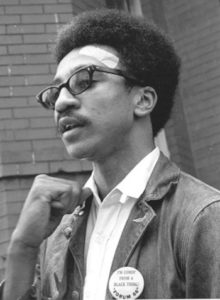
H. RapBrown, 1960's
H. Rap Brown was born on this date in 1943. He is a Black activist, writer, and spiritual leader.
Hubert G. Brown is from Baton Rouge, LA. He became involved with the American Civil Rights movement while a student at that city’s Southern High School. He attended Southern University but left in 1962 to devote himself to civil rights. Brown spent summers in Washington, D.C., with his older brother Ed joined the Nonviolent Action Group (NAG). In 1964, while chairman of NAG, he became involved with the Student Nonviolent Coordinating Committee (SNCC), and in 1966, he was appointed its voter registration director in Alabama.
One year later, he succeeded Stokely Carmichael as national chairman of SNCC. In 1968, Brown served as minister of justice for the Black Panther Party during a brief working alliance of the two Black Power organizations.
As the urban rebellions of Black discontent spread across America during the late 1960s, Brown eloquently led the militant advocacy part of the movement, making him a popular and effective speaker. These talents were the source of his adopted name, “Rap,” and were also displayed in his book "Die Nigger Die!" (1969).
The police and the FBI continually harassed Brown. He was arrested in 1967 for transporting weapons across state lines while under indictment, though he was never formally notified of that charge.
He resigned as chairman of SNCC and went into hiding, making the FBI’s ten most wanted list in 1970. Brown was apprehended in 1972m and released four years later. He converted to Islam while in prison, taking the name Jamil Abdullah Al-Amin (beautiful servant of Allah the trustworthy). After his release, he moved to Atlanta, where he lived as the proprietor of a grocery store called the Community Store. He was the Imam (leader) of the Atlanta Mosque and in Chicago, New York, and Detroit communities.
Al-Amin is a strict Sunni Muslim in his interpretation of the Koran, and his followers make aggressive outreach efforts to college campuses, malls, and the surrounding community. Al-Amin’s Mosque operates its 300-student school as well. Currently, the 70-plus-year-old Al-Amin is in a Georgia jail awaiting another trial. Al-Amin is accused of killing Fulton County Deputy Ricky Kinchen and wounding Deputy Aldranon English. They tried to serve him with an arrest warrant at his grocery store in west Atlanta on March 16, 2000.
He had been identified as the gunman through lab tests that showed that the two weapons recovered after his arrest in White Hall, AL, matched shell casings found at the shooting scene. Al-Amin was found guilty on March 9, 2002, on 13 counts, including murder, and sentenced to life in prison without the possibility of parole.
Since his conviction, questions have been raised about his conviction. Supporters say that another man who confessed to the shooting is the real shooter. The police initially believed the shooter was wounded during the gun battle, but al-Amin had no injuries. Some feel that al-Amin's conviction is politically motivated.
In 2004, the Georgia Supreme Court unanimously ruled to uphold al-Amin's conviction. In August 2007, he was transferred from state custody to federal custody because Georgia officials decided that al-Amin was too high-profile an inmate for the Georgia prison system to handle. He was moved to a federal transfer facility in Oklahoma pending assignment to Federal prison. On October 21, 2007, al-Amin was transferred to the ADX Florence supermax prison in Florence, Colorado. In March 2018, he was transferred to the United States Penitentiary, Tucson.
Al-Amin had the possibility of retrial through the 11th Circuit Court of Appeals. The investigative journalist Hamzah Raza wrote about the confession of Otis Jackson, who could exonerate Al-Amin. However, the 11th Circuit Court of Appeals rejected his appeal on July 31, 2019. In April 2020, the U.S. Supreme Court declined to hear an appeal from al-Amin.